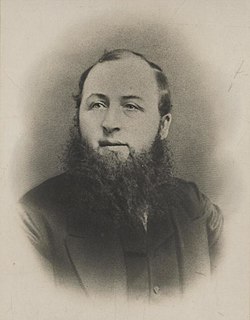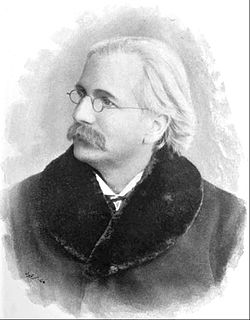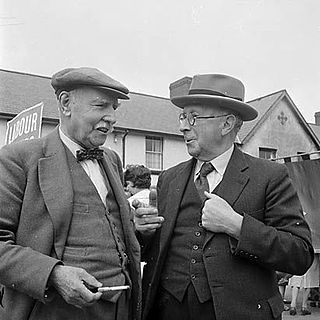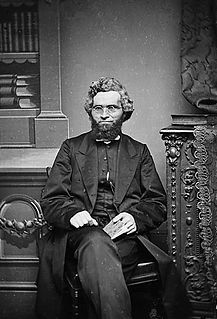Related Research Articles
Taliesin was an early Brythonic poet of Sub-Roman Britain whose work has possibly survived in a Middle Welsh manuscript, the Book of Taliesin. Taliesin was a renowned bard who is believed to have sung at the courts of at least three Brythonic kings.

John Ceiriog Hughes, was a Welsh poet and well-known collector of Welsh folk tunes. He was sometimes referred to as the "Robert Burns of Wales". Ceiriog was born at Penybryn Farm, overlooking the village of Llanarmon Dyffryn Ceiriog in the Ceiriog Valley of north-east Wales, in Denbighshire at the time and now part of Wrexham County Borough. His mother, Phoebe, was a midwife and an expert in herbal medicine. He was one of eight children, and a favourite of his mother's.

Charles Dibdin was an English composer, musician, dramatist, novelist and actor. With over 600 songs to his name, for many of which he wrote both the lyrics and the music and performed them himself, he was in his time the most prolific English singer-songwriter. He is best known as the composer of "Tom Bowling", one of his many sea songs, which often features at the Last Night of the Proms. He also wrote about 30 dramatic pieces, including the operas The Waterman (1774) and The Quaker (1775), and several novels, memoirs and histories.

Tywyn, formerly spelled Towyn, is a town, community, and seaside resort on the Cardigan Bay coast of southern Gwynedd, Wales. It was previously in the historic county of Merionethshire. It is famous as the location of the Cadfan Stone, a stone cross with the earliest known example of written Welsh, and the home of the Talyllyn Railway.

AberdyfiWelsh pronunciation: [abɛˈdəviː], also known as Aberdovey, is a village and community on the north side of the estuary of the River Dyfi in Gwynedd, on the west coast of Wales. The Community had a population of 878 as of the 2011 census. The electoral ward had a larger population of 1,282.

The National Library of Wales, Aberystwyth, is the national legal deposit library of Wales and is one of the Welsh Government sponsored bodies. It is the biggest library in Wales, holding over 6.5 million books and periodicals, and the largest collections of archives, portraits, maps and photographic images in Wales. The Library is also home to the national collection of Welsh manuscripts, the National Screen and Sound Archive of Wales, and the most comprehensive collection of paintings and topographical prints in Wales. As the primary research library and archive in Wales and one of the largest research libraries in the United Kingdom, the National Library is a member of Research Libraries UK (RLUK) and the Consortium of European Research Libraries (CERL).

Joseph Parry was a Welsh composer and musician. Born in Merthyr Tydfil, Wales, he is best known as the composer of "Myfanwy" and the hymn tune "Aberystwyth", on which the African song "Nkosi Sikelel' iAfrika" is said to be based. Parry was also the first Welshman to compose an opera; his composition, Blodwen, was the first opera in the Welsh language.
Grace Mary Williams was a Welsh composer, generally regarded as Wales's most notable female composer.

Cantre'r Gwaelod, also known as Cantref Gwaelod or Cantref y Gwaelod, is a legendary ancient sunken kingdom said to have occupied a tract of fertile land lying between Ramsey Island and Bardsey Island in what is now Cardigan Bay to the west of Wales. It has been described as a "Welsh Atlantis" and has featured in folklore, literature and song.
"Bugeilio'r Gwenith Gwyn" is an 18th-century traditional Welsh love song.
This article is about the particular significance of the year 1814 to Wales and its people.

Thomas Evan Nicholas, who used the bardic name "Niclas y Glais", was a Welsh language poet, preacher, radical, and champion of the disadvantaged of society.

Ieuan Gwyllt was the bardic name of Welsh musician and minister John Roberts. His bardic name is derived from the nom de plume he used whilst writing poetry as a boy, Ieuan Gwyllt Gelltydd Melindwr. He was born at Tanrhiwfelen, a house just outside Aberystwyth, and died in Caernarfon on 14 May 1877. He was buried at Caeathro cemetery near Caernarfon.

Anwyl of Tywyn are a Welsh family who claim a patrilinear descent from Owain Gwynedd, King of Gwynedd from 1137 to 1170 and a scion of the royal House of Aberffraw. The family motto is: Eryr eryrod Eryri, which translates as "The Eagle of the Eagles of Snowdonia." The family lives in Gwynedd and speak Welsh.

Maria Jane Williams was a 19th-century Welsh musician and folklorist born at Aberpergwm House, Glynneath in Glamorgan, South Wales. She rescued many Welsh songs from obscurity, including Y Deryn Pur and Y Ferch o'r Sger.

We'll Keep a Welcome is a 2000 album by singer Bryn Terfel of traditional hymns and folk songs associated with Wales. Terfel was accompanied on the album by the Orchestra of the Welsh National Opera, the Risca Male Choir and The Black Mountain Chorus. The majority of the songs are sung in the Welsh language.
Amy Parry-Williams (1910–1988) was a Welsh singer and writer with a special interest in Welsh folk traditions. An active broadcaster, she was an early director of the Welsh television company HTV.

Gwilym Gwent born William Aubrey Williams, was a Welsh composer.
Dafydd Nicolas, or David Nicholas was a Welsh poet.
References
- ↑ "Charles Dibdin, Songwriter, 1745-1814" . Retrieved 4 November 2012.
- 1 2 3 4 "Liberty-Hall: or, a test of good fellowship. A comic opera, in two acts. As it is performed with the greatest applause at the Theatre-Royal in Drury-Lane.... by Dibdin, Charles, 1745-1814. sourced from Oxford Text Archive".
- ↑ "Notes and Queries 1864".
- ↑ "The Bells of Aberdovey".
- 1 2 3 "Folkinfo: The Bells of Aberdovey" . Retrieved 3 November 2012.
- ↑ Thomas, Daniel Lleufer, "Thomas John (1795-1871)", Dictionary of National Biography, 1885-1900, 56, retrieved 11 December 2019
- 1 2 "The Bells of Aberdovey, who composed it?". Western Mail. 27 May 1881. p. 3. Retrieved 12 December 2019.
- ↑ Griffith, R. D. (1959). "THOMAS, JOHN (Ieuan Ddu; 1795 - 1871), musician. Dictionary of Welsh Biography". Dictionary of Welsh Biography. Retrieved 11 December 2019.
- 1 2 3 4 5 Evans, D Emlyn (25 June 1908). "The Bells of Aberdovey article from The Cardiff Times". newspapers.library.wales. Retrieved 11 December 2019.
- ↑ "Notes and News.|1909-09-04|Cymro a'r Celt Llundain - Welsh Newspapers". newspapers.library.wales. Retrieved 12 December 2019.
- ↑ "The church and Welsh Dessent". Western Mail. 13 May 1881. p. 3. Retrieved 11 December 2019.
- ↑ Club, Carmarthenshire Antiquarian Society and Field (1908). Years's Transactions of the Carmarthenshire Antiquarian Society and Field Club ...
- ↑ Löffler, M., (2019). WILLIAMS, MARIA JANE ('Llinos') (1795 - 1873), folklore collector and musician. Dictionary of Welsh Biography. Retrieved 11 Dec 2019, from https://biography.wales/article/s12-WILL-JAN-1795
- ↑ Graves, Alfred Perceval, and J. Lloyd Williams. “Welsh Folk-Song Collections.” The Celtic Review, vol. 6, no. 23, 1910, pp. 207–213. JSTOR, www.jstor.org/stable/30070020.
- ↑ Kurt Gänzl, "The Welsh Nightingale": Miss Lucy Williams, - The Blog of Musicologist Kurt Gänzl - 1 October 2019
- ↑ Funeral of Madame Williams - Brief obituary of Elizabeth Lucy Williams - The Carmarthen Journal and South Wales Weekly Advertiser , 10 October 1902, Pg. 8 - National Library of Wales - Welsh Newspapers Online
- ↑ 'Clychau Aberdyi' and Elizabeth Lucy Williams - The Cardiff Times , 19 March 1892, Pg. 6 - National Library of Wales - Welsh Newspapers Online
- ↑ Evans, D Emlyn 'The New 'Grove' on Welsh Music', The Musical Times , 1904-1995: London/New York Vol. 52, Iss. 818, (Apr 1911): 237-237
- ↑ 'Miss E. L. Williams, author of the Welsh ballad "The Bells of Aberdovey", The Brisbane Courier (1864-1933), Friday 13 May 1892, Pg. 2 - National Library of Australia Newspaper Archive
- 1 2 "The National Song Book - Online Music Book" . Retrieved 3 November 2012.
- ↑ "About us". St Peter's Church website. Archived from the original on 26 April 2012. Retrieved 3 January 2012.
- ↑ "Time and Tide Bell". Marcus Vergette official website. Retrieved 3 January 2012.